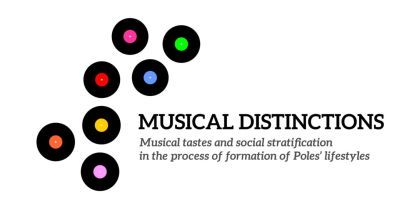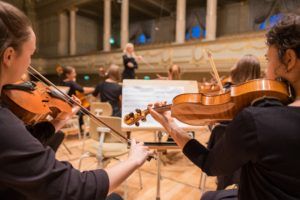
The main objective of the project is to determine to what extent lifestyle, with musical taste being its indicator, affects social stratification in the Polish context. The relationship between social stratification and lifestyle has not been yet examined in Poland in as much detail and depth as e.g. French or Scandinavian tastes that – as one may hope – makes our research a step towards understanding a complex syndrome of cultural forms. In the debates on the stratification of culture, musical tastes play a specific role. As Bourdieu (2005) argues, it is culture which best reflects the analogies between cultural behaviors and class hierarchy, and “nothing more infallibly classifies than tastes in music.” This belief has been confirmed in many studies. Music is not taught and learn at school in the same way as other spheres of art (e.g. literature), but it is surrounded by the whole area of cultural practices which is under a huge influence of social environment, especially family (Coulangeon and Lemel 2007).
We plan to analyse the impact of such factors as family, school, social relations, marital selection, on the arise of musical tastes, and the impact of the acquired preferences on changing the social position of the individual – e.g. an influence on prestige, raising people self-esteem and increasing their chances of advancement to higher positions. Also do Poles tend to judge others based on their choices of music? Is it a factor that helps people separate strangers from those individuals they are close to? There is also an issue of social status: to what extent people consciously or unconsciously use musical tastes and practices to manipulate their self-image? For example to what extent they go to the opera to be seen there? Or send their kids to music schools to make themselves look like a “cultured family”?


For the purposes of this project we adopt a broad understanding of musical activities. The practices we will analyse comprise not only the most typical forms of music participation (e.g. listening to music, playing an instrument, singing, attending musical events etc.), but also such areas as dance, ballet, theater and film. Our study will focus, firstly on preferences (‘the liking’ of music), secondly, on the actual patterns of activity (behavioral dimension) and, third, on knowledge – this is about seeing to what extent our respondents actually know the selected artists/compositions characteristic of certain musical genres.
The empirical quantitative study will be based on a representative method, more precisely on nationwide random sample. In order to extend findings from quantitative research, a qualitative study involving selected social categories will be conducted, using a method of a family study. The authors intend the presented study to be a continuation of the earlier project which investigated the relationship between social stratification and lifestyle, in terms of eating patterns (“Eating patterns, life styles and social stratification in comparative perspective” UMO-2011/03/B/HS6/03983).
Project is conducted by Institute of Philosophy and Sociology Polish Academy of Sciences and financed by Poland’s National Science Center (agreement number UMO-2017/25/B/HS6/01929).
